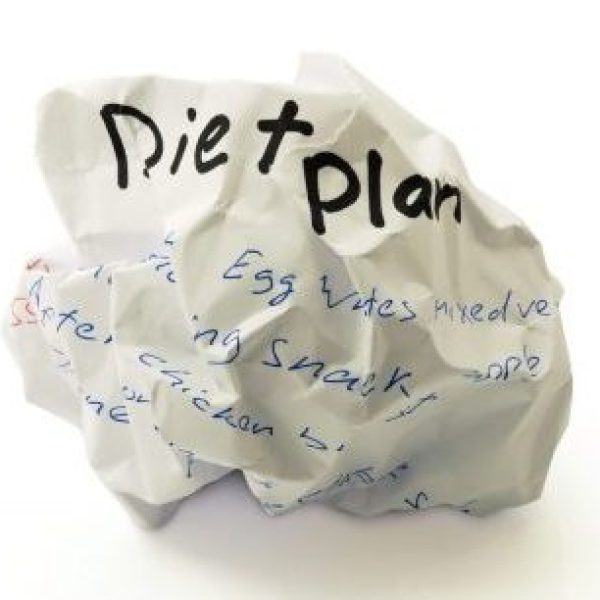I’m sure you already know that diets don’t work. Because you’ve struggled with them for years. Each time trying something more extreme than the last, until you just gave up. You may have actually lost weight but eventually ended up back where you started or even fatter. Most people blame themselves, believing that they lack enough willpower and lamenting about what if they had maintained the diet just a little bit longer…
A diet is any kind of prescriptive eating plan to change the size of your body. Temporarily (even when intending to permanently) restricting or regulating calories, certain foods, food groups or macronutrients, or dictating the times of day you can eat are all diets. It doesn’t matter if it’s not called a diet, calling it a “healthy lifestyle change”, vegan or “clean eating” does not change the fact that it is actually a diet.
I don’t suggest that you absolutely can’t ever lose weight from restricting your food intake, because chances are, you have or know someone who has before, so of course you can. You can force your body to shrink itself by taking extreme measures but it won’t last. And, you’ll eventually be met with disappointment when within a few months or years you find yourself back where you started or worse, blaming yourself or that one diet behavior that you couldn’t master or maintain. So if you are still holding on to hope that you can diet your way to health and happiness, stop here. Click away. Maybe go look at some cute kitten and puppy videos.
According to Daniel Engber,
“The tendency of dieters’ bodies to creep back toward prior weights has been among the most reliable and replicable results in the study of weight loss interventions. Research suggests that roughly 80%of people who shed a significant portion of their body fat will not maintain that degree of weight loss for 12 months; and, according to one meta-analysis of intervention studies, dieters regain, on average, more than half of what they lose within two years.” ~Scientific American
See, your body doesn’t give a rat’s ass about vanity or that last 15 pounds you’ve been wanting to lose. And it’s not supposed to. You’re body’s objective is to keep your ass alive, no matter what. The body has all kinds of strategies to try and save you from starvation. It will slow down brain function to conserve energy. It will slow down your metabolism (more on that later). It will go as far as to shut down whole organs and even consume its own tissues to stay alive. And that’s a good thing.
But once you start to eating again it will quickly snap back to the way things were before. You’ll gain back the weight you forced it to lose and then some, because your body needs to be prepared for the next time you’re in a starvation situation. The next time there’s a famine, you’ll have more stored body fat to sustain you so that your body doesn’t need to resort to those other extreme measures to keep you alive. But it’s not so cool and amazing when you want to fit yourself into your high school skinny jeans again at age 40. You can go on another bullshit diet if you want to, but it will eventually backfire.
Now, back to metabolism. Understand that metabolism is actually all of the chemical processes that occur within a living organism to sustain life. Literally everything. Metabolism is not just about losing weight. There are no magic switches, pills, tricks or gimmicks that will change only the part of metabolism that is using stored fat for energy.
We have very little control over how much energy (calories) the body needs to consume (burn) for metabolism. The energy used to just keep you alive (basal metabolic rate) accounts for 60-80% of total energy expenditure. That is, for your heart beating, breathing, hair growing, you know, important things like that. About 10% of energy expenditure goes to the process of digestion (thermic effect of food). That leaves only 10-30% of energy expenditure for movement or exercise. It doesn’t matter if you’re a couch potato or an Olympian athlete. Still only 10-30%. To make matters even worse, that energy expenditure for exercise is variable and unknown, unless you have it measured medically inside an airtight metabolic chamber.
Even though you technically have some control over how much energy you bring in (eat), you can’t control how your body goes about processing it. The hormones leptin (regulates energy balance, so the body does not trigger hunger responses when it does not need energy), ghrelin (stimulates appetite and fat storage), and insulin (manages blood sugar to provide cells with energy) help to determine what gets used and what gets stored in the form of fat for later use. Your body is a complex machine designed to stay alive, not risk it all to satisfy your skinny fantasies. The stress on your body from dieting wreaks havoc on these important hormones and when they are not operating properly they send irregular messages that disrupt proper metabolic function (makes it much harder to lose weight again).
Diets are inherently unsustainable. Restricting calories, macros or food groups becomes difficult in the long term because the more you restrict, the more you obsess about food. It may be possible to hang on for a while, for some, maybe even a pretty long while but eventually your body will win. The restriction makes you almost crazy and creates a situation where bingeing is nearly irresistible. This is not due to lack of willpower or weakness, it’s biology. Your body will rebel against your food restriction, and that’s exactly what it is supposed to do, even though it will bring disappointment. So even if you can manage to lose some weight by restricting calories, the result is largely temporary.
All hope is not lost. It is not impossible to lose “unhealthy excess weight” but you, nor social media celebrities, nor a BMI weight chart, nor medical doctors, can determine what a “healthy weight” is for you. It is determined by your body and you must learn to listen to its cues to help you eat intuitively for nourishment and accept the outcome. This sounds pretty dire but it’s not.
Focusing on health, happiness and mobility instead of dress size or numbers on a scale will always take you to that sweet spot where you can maintain a good lifestyle. Free your mind of diet culture influence and literally eat whatever you want, when you want because your body will send you signals about what you need and when to stop eating. You may gain a little weight in the beginning, until you get the hang of it and your body trusts you not to starve it again. But unless you have an extreme disorder called hyperphagia, you’ll eventually stabilize without even having to put forth effort.
I never make promises to my clients about how much weight the can lose, or even that they’ll lose weight at all. The focus of my food & lifestyle coaching practice is to help you design a lifestyle that is healthy, makes you happy and allows you to genuinely feel good about yourself, without the guilt, anxiety and shame that comes with weight loss diets.
Are you ready to create your own delicious lifestyle?


 I’m LifeBliss Lisa and I coach black women on how to create intentional, healthy, soft lifestyles.
I’m LifeBliss Lisa and I coach black women on how to create intentional, healthy, soft lifestyles.